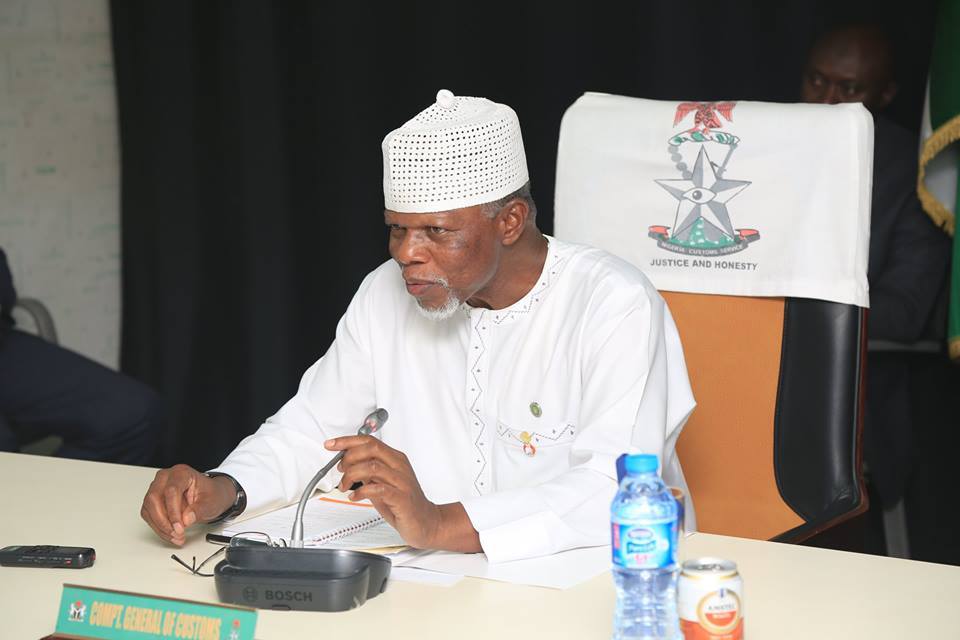
Anti-corruption czar, Itse Sagay, voiced the concern of ordinary Nigerians and the business community recently when he bemoaned the rot in the Nigerian Customs Service. His complaint of rampant bribery at the ports of entry tallied with earlier reports from other sources that suggest a service resistant to reform. As the country’s second major source of revenue, however, the Comptroller-General of Customs, Hameed Ali, should produce tangible results or make way for a change agent.
Lurid tales of endemic corruption and the flooding of the Nigerian market with fake, substandard and prohibited goods are commonplace. But Sagay, as Chairman of the Presidential Advisory Committee Against Corruption, by adding his voice to this national shame, has put President Muhammadu Buhari and the Finance Minister, Kemi Adeosun, on the spot. They should quickly look into the activities of this important agency to save the economy and the lives of Nigerians. Smuggling is thriving and government is losing billions of naira through duty evasion. Entire domestic sectors are under threat. Smuggling, combined with a harsh macroeconomic environment, destroyed our once thriving textiles sub-sector.
Sagay accused the agency of “bold and brazen” corruption. His view that Customs officers appeared to be thumbing their nose at the current administration resonates with investigative reports undertaken in 2015 and early this year by two online media outlets that found a thriving complex of graft at the seaports. “There is no difference in Customs since May 29, 2015 (when Buhari was sworn in). If you go to Tin Can Island, it is business as usual,” is the candid view of Sagay. The report in The Cable online, in stark, alarming detail, showed an entire system based on graft and economic sabotage by Customs and other agencies at the ports.
The NCS is the agency charged with collecting tariffs and controlling the flow of goods in and out of a country. In Nigeria, it is the second largest revenue collecting agency after the Federal Inland Revenue Service. For the year 2017, it projects to collect N1.1 trillion (up from an initial N900 billion) in duties, tariffs, charges and levies on goods imported into or exported out of Nigeria and in factory excise duties, among others.
Whereas, on its site, the NCS lists poultry, refined vegetable oil, fruit juice in retail packs and soaps and detergents as prohibited, they are available for sale in markets nationwide. Recent seizures, such as the alarming consignment of 661 guns and N5 billion worth of bad tyres that had passed through the ports, confirm the magnitude of smuggling.
When in August 2015, Buhari tapped Ali, a retired Army colonel with a reputation for incorruptibility and firmness, to head the NCS, hopes were high that he would quickly disinfect the rotten service. But 20 months on, corruption, by all accounts, is thriving there. Those who feared that Ali’s lack of knowledge of the workings of the Customs would undermine his sincere efforts now believe they have been proved right. True, recession has set in, resulting in lower trade, while the government’s ban on direct forex sales for the importation of 41 items has hit revenues. Yet, the lower figure of N898 billion earned by Customs in 2016, short of the N904 billion target, is a cause for concern.
Adeosun acknowledged the outsider handicap recently when she declared: “Ali is doing his best to instil discipline, but being an outsider in an insider’s place, it is a difficult job.” Ali’s albatross is not the lack of zeal. In October 2016, he flushed out 29 senior officers for alleged corruption, a follow-up to 17 earlier sacked for sundry acts of indiscipline. He had also asked officers to fill asset declaration forms, a veritable take-off platform to identify officers living above their means.
But more needs to be done. When about 80 per cent of goods coming into the country are fake or substandard, according to the Standards Organisation of Nigeria, and importers face extortion and delays that add to their costs, the need to act to ensure ongoing economic recovery efforts takes on added urgency. The recent measure targeting vehicles is akin to locking the stable doors after the horses have bolted.
Ali should revisit his strategies for his three-point mandate from Buhari: to reform, restructure and substantially raise revenue. Since the first customs unit in the then Niger Coast Protectorate in 1891, a series of reorganisations have been undertaken, the last being in 2003. The NCS needs a thorough shake-up. Government should be serious; that none of the agency’s scanning machines is functioning is scandalous and has created room for fraud and bribery.
Experts recommend robust funding for the Customs and deployment of functioning technology that will reduce face-to-face contact between importers and customs personnel to the barest minimum. Reforms should start with a fierce anti-corruption war and take in today’s realities. In 2003, the United States re-established US Customs and Border Protection that collects $30 billion duties annually. Singapore, through mergers and de-coupling of some units with other agencies, restructured its customs agency and has won applause for efficiency.
Adeosun should not remain aloof from the Customs; they are too important to be left to Ali alone. Punishment for corrupt officers should go beyond retirement: they should be prosecuted. Government should continue to sweep away bad eggs. The reforms should start today. Buhari and Adeosun should review Ali’s performance and consider changes if necessary.
END

Be the first to comment